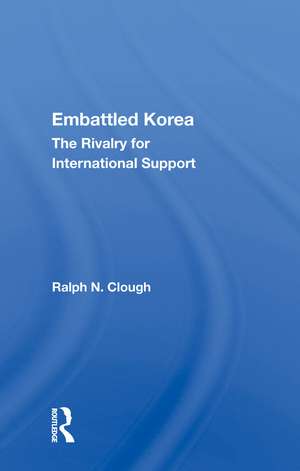Embattled Korea: The Rivalry for International Support
Autor Ralph N. Cloughen Limba Engleză Hardback – 7 iun 2019
Preț: 764.20 lei
Preț vechi: 1102.79 lei
-31% Nou
Puncte Express: 1146
Preț estimativ în valută:
146.23€ • 159.34$ • 123.22£
146.23€ • 159.34$ • 123.22£
Carte tipărită la comandă
Livrare economică 23 aprilie-07 mai
Preluare comenzi: 021 569.72.76
Specificații
ISBN-13: 9780367013684
ISBN-10: 0367013681
Pagini: 416
Dimensiuni: 152 x 229 mm
Greutate: 0.45 kg
Ediția:1
Editura: Taylor & Francis
Colecția Routledge
Locul publicării:Oxford, United Kingdom
ISBN-10: 0367013681
Pagini: 416
Dimensiuni: 152 x 229 mm
Greutate: 0.45 kg
Ediția:1
Editura: Taylor & Francis
Colecția Routledge
Locul publicării:Oxford, United Kingdom
Cuprins
Preface -- Korea: Victim of the Cold War -- Political Change and External Influence, 1953–1979 -- Interdependence Versus Autarky -- Military Confrontation and Abortive Dialogue -- Coping with Change in the 1980s: Domestic Trends -- Coping with Change in the 1980s: Confrontation and Dialogue -- South Korea, the United States, and Japan -- North Korea, the Soviet Union, and China -- Diplomatic Competition -- Beyond Diplomacy -- Toward Cross-recognition: The Soviet Union, China, and Japan -- Toward Cross-recognition: U.S. Policy -- Appendix 1 -- Appendix 2 -- Appendix 3
Descriere
This comprehensive book examines the history of Korea's division and the political and economic development of both Koreas, their military confrontation, and their efforts at dialogue. Mr. Clough focuses on the international rivalry between the two, including relations with big power supporters and diplomatic competition inside and outside the UN and the nonaligned movement. The first book to explore in detail the competition between Seoul and Pyongyang outside the diplomatic circuit—from overseas construction projects to international athletic contests—Mr. Clough's study breaks new ground, analyzing South Korea's growing contacts with the USSR and the PRC, as well as North Korea's relationship with Japan and the United States. He views these contacts as probable precursors of diplomatic recognition of both Koreas by all four big powers. Identifying the problems and the choices for the United States in the rapidly changing environment in and around Korea, Mr. Clough makes recommendations for the future direction of U.S. policy.
